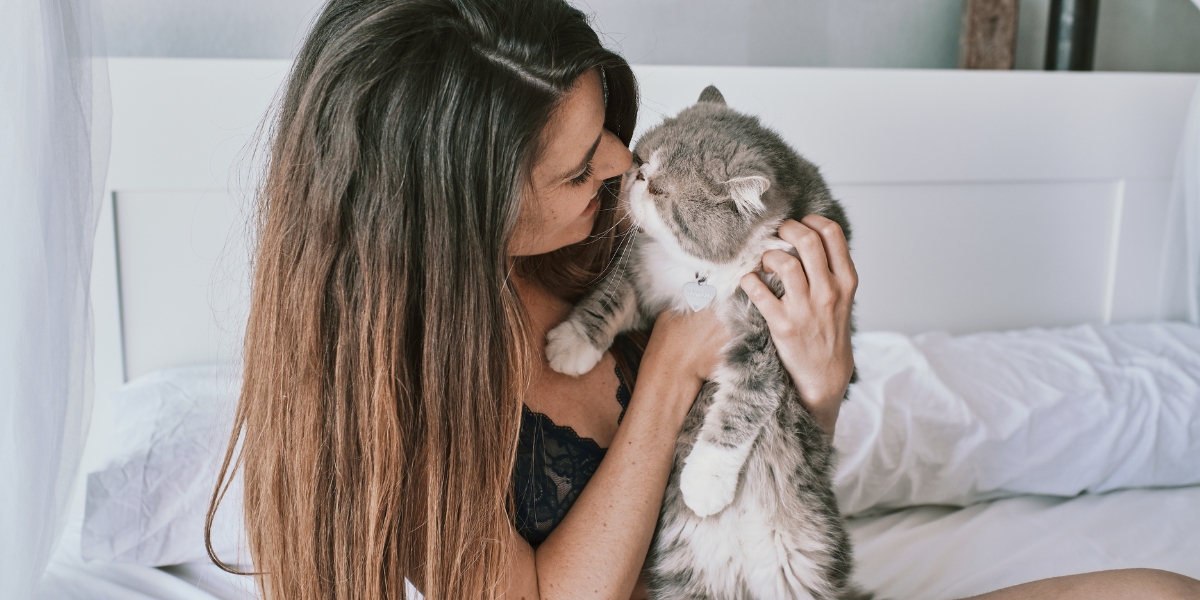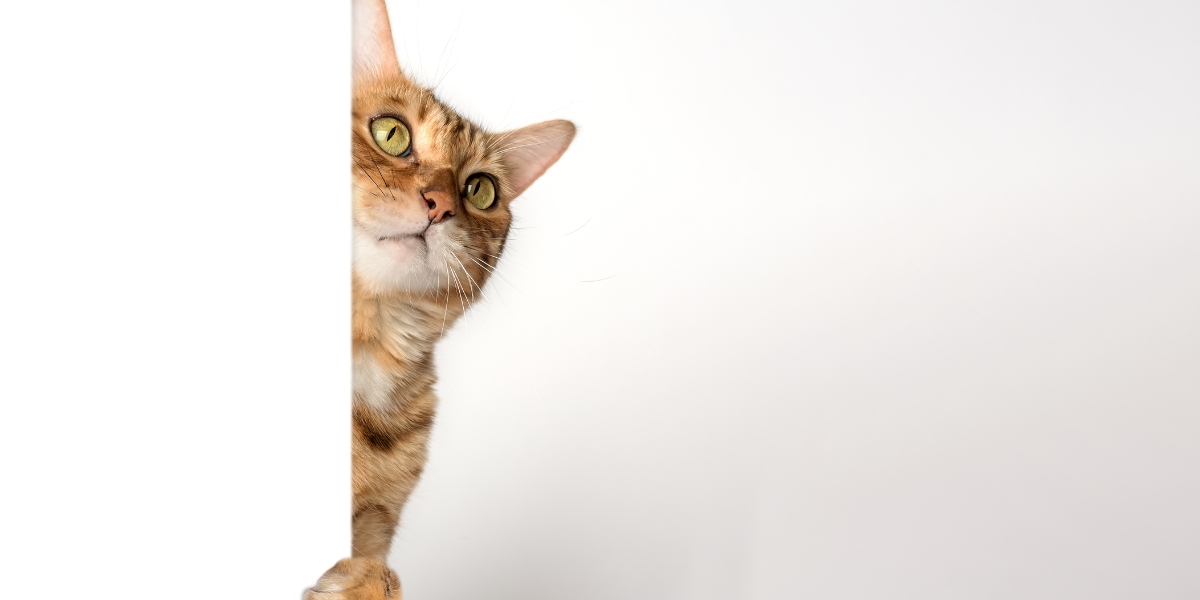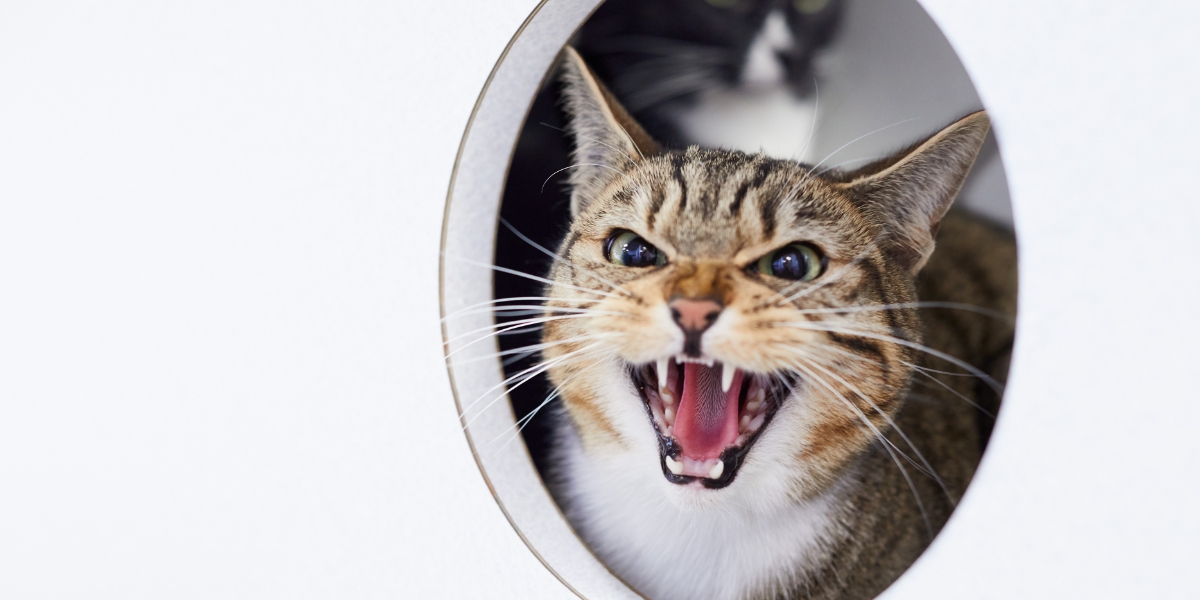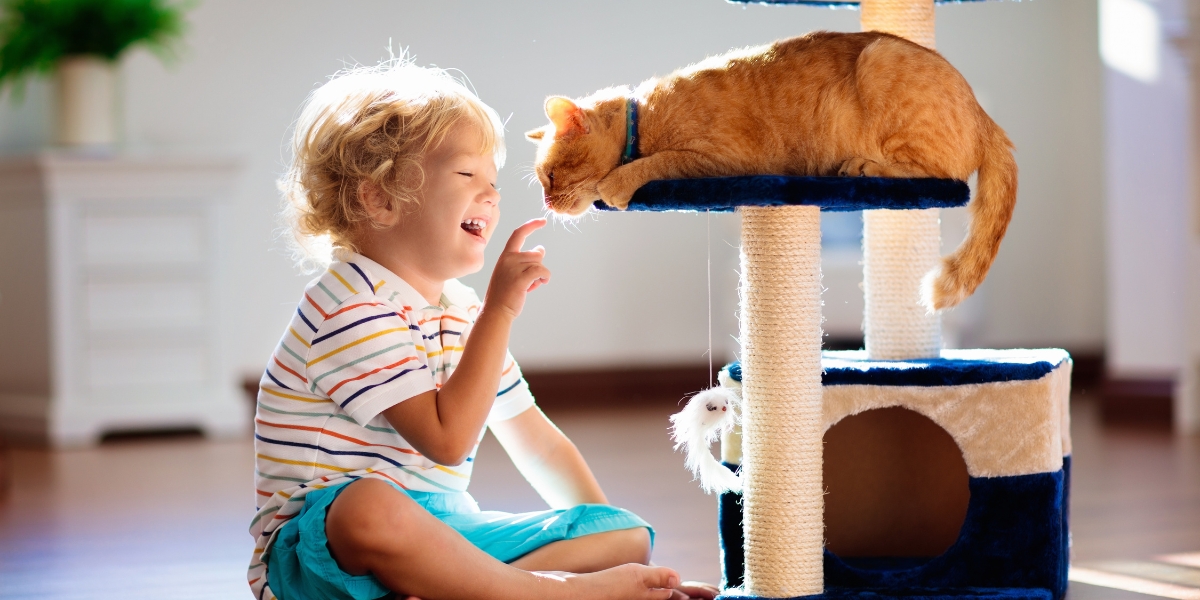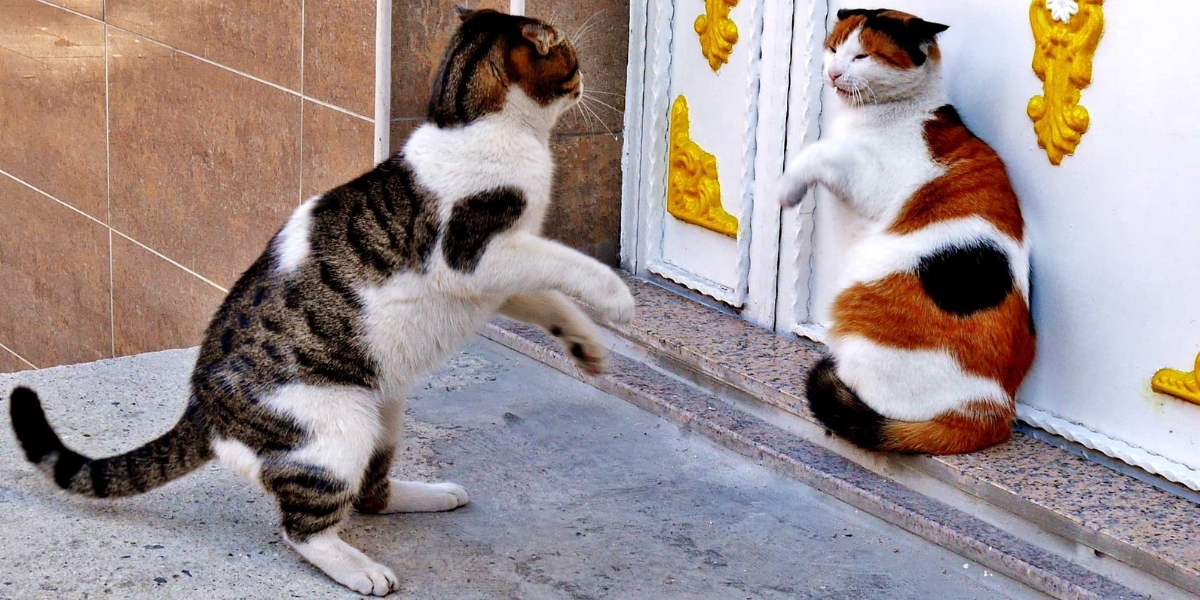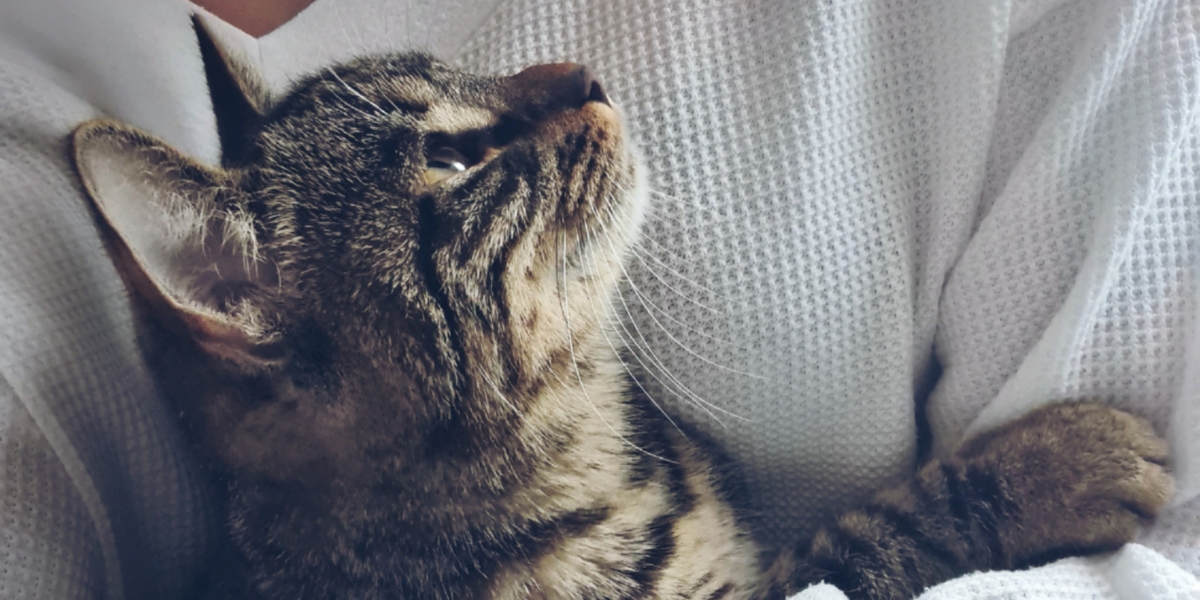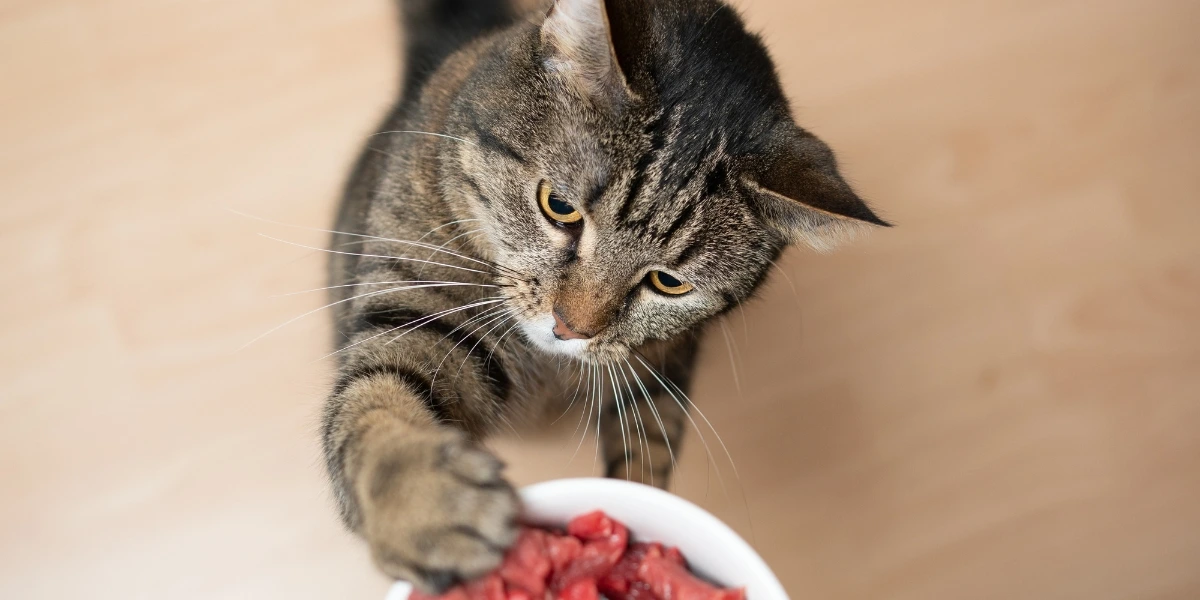Why Does My Cat Guard My Door?
Cats are known for their strange creatures quirks, often acting in ways we don’t fully understand. One moment they seem aloof and indifferent, and the next, they’re sitting alertly by a door as if on a mission. If you’ve noticed your cat starting to sit by your door, you might wonder, “Why is this happening?” There are many possible reasons behind this behavior, from seeking warmth to being protective of their space. My oldest cat, RIP Crook, often spent hours sitting at the bottom of the door, especially when the A/C unit was running or the room felt cozy.
Doorways are natural spots of curiosity for cats, serving as boundaries and points of interest. The theory goes that these areas might offer a mix of heat or drafts due to poor insulation, making them attractive during a heat wave or cooler nights. Cats also love watching shadows, whether it’s the flicker of a nearby plant or the light coming from another room. Tyra, another of my cats, once spent an evening guarding the front door, her eyes glued to the tiny tail of a disappearing bush visitor—a curious neighborhood cat.
As someone who has fostered kittens and watched them follow each other like ducklings in a row, I’ve learned that these habits aren’t just random. Whether it’s a bathroom door or a bedroom doorway, your cat may see this spot as their chosen sentry post. They could be feeling protective, possessive, or simply drawn to the activity beyond the door. Their actions may seem amusing, but they reveal deeper instincts and bonds they share with you.
What Is ‘Guarding’?
When your cat guards your door, it’s a normal behavior that shows their protective instincts. They may express their affection through purring, kneading, or head butting, making you feel watched and cared for. This display of loyalty could include actions like licking nearby objects or even you, as a way of communicating their feelings. Cats have unique ways of showing love, and their guarding is often a sign of the bond they share with you.
Signs That Your Cat Is Looking Out for You:
- Staying close by your side
- Trailing behind you wherever you go
- Fixing their gaze on you
- Meowing or scratching when doors are shut
- Waiting near the bathroom door
Domestic cats, though tamed, have learned behaviors that make them highly receptive to living with people across diverse cultures. One key reason they may follow their owner to the restroom or wait outside the bathroom is their clingy behavior, often tied to their protective instincts. This guarding can also extend to times when you sleep or shower, as they feel the need to stay close and ensure your safety.
The 9 Common Reasons Why Your Cat Guards Your Door
Here are the reasons your cat might be guarding the door. Let’s explore each one in more detail:
1. Your Cat Loves You
Your cat’s behavior of guarding your door might seem puzzling, but it often shows how much they care for you. While cats are known for their air of independence, don’t be fooled, they feel deeply connected to their owners.
When they sit by a locked room or stick close during loud noises, such as running water or the sound of a toilet flushing, they may be protecting you from what they perceive as a threat. Cats associate these strange places and smells with vulnerability, imagining something could disappear or be attacked.
This selfless act of staying nearby, even when they seem aloof, is likely their way of providing company and ensuring your safety in situations they find uncertain or dangerous. Sometimes, the simplest explanation is that they love you too much to let you out of their sight, even for a moment.
2. Your Cat Is Curious
Cats are naturally inquisitive animals, and their curiosity is a key trait that helps them understand their world. In the wild, this instinct ensures they are aware of resources, potential threats, and safe spots to rest.
When it comes to closed doors, the mystery of what lies beyond becomes irresistible to them. They may linger outside, trying to investigate or get acquainted with the room they can’t access.
If your cat spends time outdoors, this urge to explore becomes even stronger, as they instinctively want to know everything about their environment, both inside and out. This behavior can also stem from an instinctive need to be a detective.
When a door is closed, your cat might be drawn to the noises, smells, or activities happening on the other side, fearing they might miss something exciting or fun.
Whether it’s the sound of water running in the bathroom or an unfamiliar smell wafting through the air, their curiosity is intrigued by anything that feels out of the ordinary. This isn’t just playful; it’s part of their survival instinct to stay aware of their surroundings and ensure their space is safe.
3. Your Cat Is Protecting You
Your cat might be protecting you by guarding your door because, as solitary creatures, they are naturally protective of their owners. They can be perfectly capable of acting independently, but when it comes to keeping their loved ones safe, they show their protective nature.
The vocalizations and actions your cat makes while guarding could be their way of alerting you to intruders or threats. They value the bond with you and are maintaining their role as your trusted companion, ensuring your safety.
4. It’s a Habit
Your cat may sit by the door for long periods, especially if they’ve grown accustomed to guarding it over time. This can become a habit as they enjoy the familiarity and predictability of this ritual. It may start when your cat spends time outside the bathroom, or as part of their nighttime routine, where they sit upright and stay near the door. As time goes on, it can develop into a habit they repeat every day, adding comfort and a sense of security. The cause is often just the familiarity of the practice, not necessarily something they need to escape or keep others away from.
5. Separation Anxiety
Cats can feel stressful and anxious when separated from their owners, especially if there’s a closed door between them. This behavior of guarding a door, like the bathroom, might be a sign of separation anxiety and an underlying fear of being left alone.
Your cat may cling to you with utmost affection and seem anxiously awaiting your return, worried about feeling trapped or abandoned. If this behavior persists or causes stress, seeking a veterinarian’s advice could help you understand and navigate the condition better.
6. Your Cat Loves To Play
For your cat, the bathroom can feel like an equivalent of an amusement park, full of surprises and fun. From unraveling toilet paper rolls to pawing at cotton balls or watching dripping faucets, every little thing becomes an exciting source of playtime.
These mischievous activities aren’t just about entertainment; they’re also your cat’s way of getting your attention, turning into a playful, sometimes vicious furball.
Even something as simple as a stack of towels can spark their curiosity, making the bathroom a favorite spot for their playful antics.
7. Your Cat Is Territorial
Cats are territorial creatures by nature, and this often explains their habit of guarding doors. They see their environment as something to protect and micromanage, ensuring it stays safe and free from intrusions.
A door separating them from their space, whether it’s the bathroom or another room, might feel like a threat to their territory, especially if they can’t see what’s happening on the other side. This behavior can become more pronounced when new elements are introduced to the house, such as other pets or furniture, which may trigger their need to claim and protect resources like food bowls, litter boxes, or sleeping spots.
In some instances, you may even notice your cat rubbing surfaces or lying near doors to mark their space. This is their way of using scent to claim the area and ensure their presence is felt.
Their preference for doors being open at all times ties back to their need to manage their surroundings and prevent any unwelcome surprises. If the door is closed, they might feel stressed or threatened, believing they must keep others out to maintain their sense of control and security.
8. Your Cat Is Attached to You
Cats are unique in how they form affectionate bonds with their owners, often displaying a deep attachment that provides them with a sense of security and comfort. Unlike dogs, their relationships with humans can be more complex and less predictable.
Studies suggest that cats may view their owners as a secure base, much like an infant relies on a caregiver. This explains why some cats insist on guarding doors, they feel the need to stay close and ensure their trusted person is nearby.
Individual differences play a big role in this behavior. Cats with a high level of emotional dependence on their owners might show a stronger desire to be near them. Such cats may even appear less accepting of independence, preferring constant proximity and interaction.
Conversely, outdoor cats or those with multiple individuals in their home may exhibit fewer attachment-related behaviors. The emotional investment cats have in their environment and relationships helps explain their seemingly codependent tendencies.
For example, a cat may follow its owner to the bedroom at night, not out of distrust but because it finds comfort in their presence. Similarly, cats rely on positive situations such as play and feeding to strengthen their trust and bond with people in the house.
While some cats may appear aloof, others form deep attachments and may even pine for their owner when apart. Building a positive relationship with your cat involves being engaged in their routine and ensuring they feel secure.
A cat’s attachment isn’t just about neediness—it’s about the unique friendship and trust they share with their human. For example, if you’re curious about some other quirky behaviors, like when your cat walks between your legs, you might find some interesting insights on that here.
Do I Need to Stop My Cat From Guarding My Door?
Your cat guarding the door is usually a harmless behavior, but there are times when it can pose a risk. For example, constant scratching at the door can cause destruction or create the chance of someone accidentally stepping on your pet when walking into a room.
While this habit may seem harmless, addressing the reason behind it is essential for maintaining a healthy and stress-free environment.
Sometimes, guarding is a result of separation stress, as cats seek comfort and security near their favorite person. To help, create cozy spots where they can relax, rest or hide away.
Hepper Nest Beds are a great option, with their modern design and high sides that provide a warm, hug-like support tailored to a cat’s specific needs.
If your cat becomes overly territorial, offering an assortment of toys, enrichment devices, and litter boxes in multiple locations can help redirect their energy. Hepper Hi-Lo Modern Scratchers are another excellent choice to keep your kitty engaged.
They feature sturdy cardboard, plywood, and metal frames, with adjustable heights for maximum exercise, stretching, and fun, reducing any chance of damaging relationships with other pets or household members.
Providing these essentials ensures your cat feels comfortable, secure, and less likely to guard your door out of anxiety. It also keeps your home tidy and your feline happy, rested, and ready to play when you return.
Reasons to manage your cat’s guarding behavior include:
- Feeling it’s becoming too overwhelming
- Noticing your cat showing signs of aggression
- Observing your cat appearing more anxious or stressed
If your cat turns into a scratching maniac, it might lead to chaos with torn stuff and cardboard pieces everywhere. To avoid the worry, consider replacements like the Hepper Hi-Lo Scratcher, which is durable and long-lasting.
This awesome scratcher keeps your cat engaged and reduces the chance of them getting overprotective or resorting to extreme behaviors like a swipe or bite at people invading their personal space. Keeping them watched and happy with enough alternatives helps maintain balance without causing stress.
How Can You Discourage Guarding Behavior?
If you want to discourage your cat from guarding the door, it’s important to first check for any underlying health issues that might be exacerbating the behavior.
A veterinarian can help you understand whether your cat is experiencing any stress or anxiety. To manage this, try introducing calming routines like consistent meal times or using pheromone sprays that help reduce stress.
In some cases, medication might be needed if the behavior is linked to deeper emotional issues. Avoid giving your cat extra attention when it guards the door, as this may reinforce the behavior.
Additionally, keeping your cat well-fed and healthy can help and if you’re interested in a nutritious treat, here’s a helpful guide on how to cook chicken livers for cats.
Conclusion
If your cat is guarding the door, it’s important to understand that this behavior is normal for many cats. It can arise from various situational cues, such as a need for privacy or comfort. For example, they may be protecting their litter tray or wanting a quiet space to rest. This behavior is also linked to your cat’s individual style of attachment, where they may seek to foster closeness with you.
While door-guarding can sometimes seem problematic, it often stems from the cat’s desire to maintain peace and feel secure in their environment. It’s a sign of affection and love, and it can even be a quirky way of showing their bond with you. By understanding these idiosyncrasies, you can learn to embrace this behavior as a part of your cat’s unique personality.
If you’re curious about other unusual behaviors, like your cat’s back twitching, you can read more about it here.


